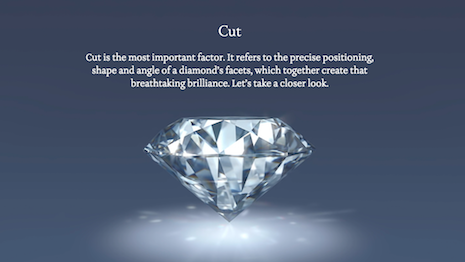 Tiffany's diamonds: A cut above the rest. Image credit: Tiffany & Co.
Tiffany's diamonds: A cut above the rest. Image credit: Tiffany & Co.
By Milton Springut A federal court in New York awarded jeweler Tiffany & Co. $19.35 million − $3.7 million in profits, trebled for bad faith infringement to $11.1 million, $8.25 million in punitive damages and attorney’s fees (to be assessed) – against wholesale discount club operator Costco Wholesale Corp. The case involved allegations of trademark infringement by Costco for using signage identifying jewelry items as “Tiffany” rings. Following a jury trial, the court found Costco to be a bad-faith infringer, affirmed the jury’s profits award, and enjoined any further use by Costco of the term Tiffany. Tiffany & Co. celebrates the 130th anniversary of the Tiffany® Setting The Tiffany-Costco case provides several useful takeaways for the luxury goods business in combating infringements, especially against large-scale infringers. Here are some: Generic meaning is not a free pass to infringement Costco contended that “Tiffany” is used within the jewelry industry in the context of the combined term, “Tiffany setting,” to denote a certain type of multipronged solitaire ring setting. That would make the phrase “Tiffany setting” a descriptive, non-trademark term. This was not really disputed, and the court accepted Costco’s contention as fact. While Costco sometimes used signage that combined Tiffany with other words such as setting, set and style, on many occasions it used Tiffany alone without any modifier, which the court characterized as a “standalone” use. That, the court found, infringed Tiffany’s mark as it led customers to believe (falsely) that the jewelry was made by Tiffany. The jury later found that signage that had Tiffany on one line and the modifier “set” on a second line should also be treated as an infringing standalone. So this was a case where the term – Tiffany – had both generic and brand meanings, and yet Costco was found to be a willful infringer, and assessed a heavy penalty. Reading the opinion, one gets the impression that Costco was attempting to exploit the ambiguity in the term by using it in a way that would both confuse consumers and yet be defensible as a generic use. If Costco truly was merely trying to identify its jewelry as having a “Tiffany setting,” it could have stated that clearly on its signage. The failure to use clear language was either foolish or calculated – and the court’s verdict indicates that it viewed it as calculated. Courts will look at the entire story to assess bad faith Costco tried to explain away the standalone use on signage as mere clerical error intended to refer to the Tiffany settings on the jewelry. The court rejected that explanation in view of the totality of Costco’s conduct, including (1) displays of fine jewelry are an integral part of Costco’s marketing strategy; (2) Costco made frequent internal and external references to Tiffany as a quality and style benchmark; (3) Costco displayed rings with “Tiffany” signage in proximity to displays of name-brand luxury watches; (4) in response to customer inquiries, Costco’s salespeople described such rings as “Tiffany” rings; and (5) Costco used purported valuations identical to prices that Tiffany had actually charged for similar rings, in certificates that Costco provided to buyers of rings sold under the infringing signage. These facts together built a compelling case that Costco was intentionally trying to exploit Tiffany’s brand, not just using a generic jewelry term. One takeaway is that thorough investigation of an infringer is crucial. Some of this evidence clearly was obtained though undercover investigation. Other evidence was obtained through Costco’s records and deposition testimony obtained in discovery. Even though any one item might not by itself seem all that significant, put together they can create a convincing story. An old saying in the law of evidence is that “a brick is not a wall.” One item of evidence need only be like a brick. A good lawyer, like a good mason, takes many bricks and builds a wall. Tiffany’s lawyers put together many bricks to create an impressive wall – that Costco in bad faith infringed their client’s trademark. Look to the full value of infringements in assessing profits Trademark law allows a trademark owner to collect its own damages and profits from an infringer. Damages are usually very hard to prove and are rarely awarded. That leaves the infringer’s profits as the principal form of monetary relief. Based on Costco records, the court found about $7.2 million in sales with infringing signage. Costco argued that its average profit margin, based on purchase invoices for jewelry, was 13 percent, which would mean less than $1 million in profits. But Tiffany presented evidence that Costco’s profits were not limited to the margin between product costs and sales, but also include very substantial sums derived from warehouse membership fees. Costco uses a “treasure hunt” marketing concept − creating “buzz” among members by offering “brand name merchandise at exceptional values” to drive frequent member visits and renewals. Based on that evidence, the court found that Costco’s asserted profit margin was “artificially small, and was made possible chiefly by the subsidizing impact of membership fees, which are themselves enhanced by the pull of the ‘treasure hunt’ tactic in which Costco uses extraordinary bargains on brand-name merchandise to pull customers into its stores.” So instead, the court adopted $3.7 million – the amount recommended by the jury – as Costco’s profits, nearly four times the profits under Costco’s calculations. THIS IS AN important takeaway: infringements often have secondary value to the infringer, such as by drawing in customers looking for brand-name items at bargain prices, who then spend money on other goods. The only way to deter infringement is to take all profits out of infringement – and that includes secondary profits.
 Milton Springut is a partner at Springut Law PC
Milton Springut is a partner at Springut Law PC
